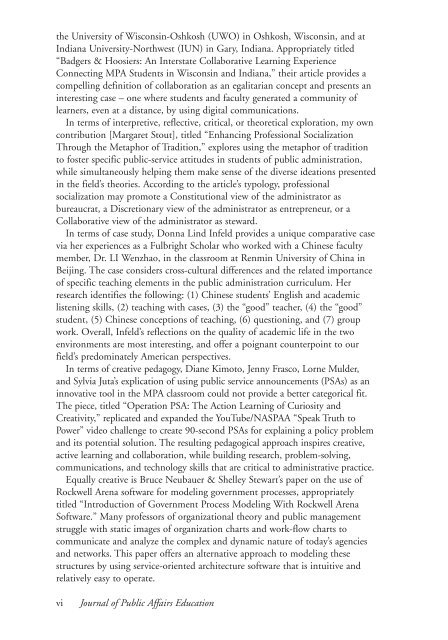JOURNAL OF PUBLIC AFFAIRS EDUCATION - naspaa
JOURNAL OF PUBLIC AFFAIRS EDUCATION - naspaa
JOURNAL OF PUBLIC AFFAIRS EDUCATION - naspaa
You also want an ePaper? Increase the reach of your titles
YUMPU automatically turns print PDFs into web optimized ePapers that Google loves.
the University of Wisconsin-Oshkosh (UWO) in Oshkosh, Wisconsin, and at<br />
Indiana University-Northwest (IUN) in Gary, Indiana. Appropriately titled<br />
“Badgers & Hoosiers: An Interstate Collaborative Learning Experience<br />
Connecting MPA Students in Wisconsin and Indiana,” their article provides a<br />
compelling definition of collaboration as an egalitarian concept and presents an<br />
interesting case – one where students and faculty generated a community of<br />
learners, even at a distance, by using digital communications.<br />
In terms of interpretive, reflective, critical, or theoretical exploration, my own<br />
contribution [Margaret Stout], titled “Enhancing Professional Socialization<br />
Through the Metaphor of Tradition,” explores using the metaphor of tradition<br />
to foster specific public-service attitudes in students of public administration,<br />
while simultaneously helping them make sense of the diverse ideations presented<br />
in the field’s theories. According to the article’s typology, professional<br />
socialization may promote a Constitutional view of the administrator as<br />
bureaucrat, a Discretionary view of the administrator as entrepreneur, or a<br />
Collaborative view of the administrator as steward.<br />
In terms of case study, Donna Lind Infeld provides a unique comparative case<br />
via her experiences as a Fulbright Scholar who worked with a Chinese faculty<br />
member, Dr. LI Wenzhao, in the classroom at Renmin University of China in<br />
Beijing. The case considers cross-cultural differences and the related importance<br />
of specific teaching elements in the public administration curriculum. Her<br />
research identifies the following: (1) Chinese students’ English and academic<br />
listening skills, (2) teaching with cases, (3) the “good” teacher, (4) the “good”<br />
student, (5) Chinese conceptions of teaching, (6) questioning, and (7) group<br />
work. Overall, Infeld’s reflections on the quality of academic life in the two<br />
environments are most interesting, and offer a poignant counterpoint to our<br />
field’s predominately American perspectives.<br />
In terms of creative pedagogy, Diane Kimoto, Jenny Frasco, Lorne Mulder,<br />
and Sylvia Juta’s explication of using public service announcements (PSAs) as an<br />
innovative tool in the MPA classroom could not provide a better categorical fit.<br />
The piece, titled “Operation PSA: The Action Learning of Curiosity and<br />
Creativity,” replicated and expanded the YouTube/NASPAA “Speak Truth to<br />
Power” video challenge to create 90-second PSAs for explaining a policy problem<br />
and its potential solution. The resulting pedagogical approach inspires creative,<br />
active learning and collaboration, while building research, problem-solving,<br />
communications, and technology skills that are critical to administrative practice.<br />
Equally creative is Bruce Neubauer & Shelley Stewart’s paper on the use of<br />
Rockwell Arena software for modeling government processes, appropriately<br />
titled “Introduction of Government Process Modeling With Rockwell Arena<br />
Software.” Many professors of organizational theory and public management<br />
struggle with static images of organization charts and work-flow charts to<br />
communicate and analyze the complex and dynamic nature of today’s agencies<br />
and networks. This paper offers an alternative approach to modeling these<br />
structures by using service-oriented architecture software that is intuitive and<br />
relatively easy to operate.<br />
vi<br />
Journal of Public Affairs Education
















